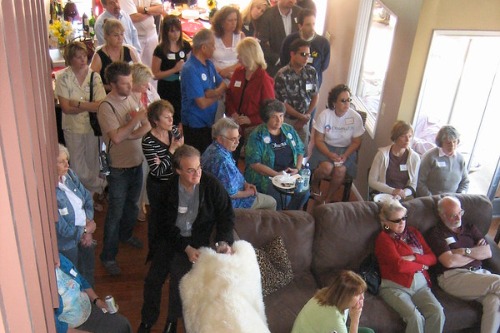1. Letting Everyone Serve Themselves… Without Setup

Buffet-style is great in theory, but if there aren’t enough serving utensils, plates, or space to move, it becomes a mess. Guests end up juggling hot dishes, bumping elbows, or waiting awkwardly for someone to pass the tongs. It feels more like a scramble than a spread.
Set up a clear flow with everything guests need—plates, napkins, cutlery, and labeled dishes if needed. Make it easy to navigate and serve. A little prep makes self-serve feel seamless. And keeps the vibe relaxed, not rushed.
2. Saying “Just Bring Whatever”

It sounds laid-back, but telling guests to “bring whatever” puts the pressure back on them. They’re left guessing what’s needed—wine? Dessert? A side dish?—and worrying about showing up with the wrong thing. It feels more like a test than an invitation.
Instead, offer a few specific options or say “just bring yourself” if you truly don’t need anything. Guests want to feel helpful, not confused. A little guidance goes a long way. Clarity is the real chill.
3. Not Having a Plan for Food

Winging it might sound spontaneous, but when guests arrive and nothing’s prepped, it creates awkward downtime. People don’t know whether to help, hover, or just wait around. It can make the evening feel disorganized and a little uncomfortable. “Casual” shouldn’t mean chaotic.
Even a loose plan—like snacks out when people arrive and dinner at a general time—helps set the tone. You don’t need a rigid schedule, just a rhythm. Guests relax more when they know what to expect. Structure is secretly soothing.
4. Playing “Whatever Music’s On”

Letting a random playlist run might seem effortless, but music sets the mood—and guests notice when it’s off. If it’s too loud, too mellow, or full of jarring transitions, it can make people feel uneasy. Silence can be just as awkward if the room goes quiet. Background music should support the vibe, not distract from it.
Take a few minutes to queue up a playlist that fits the tone—something upbeat but not overpowering. And keep the volume low enough for conversation. Thoughtful music makes everything feel more intentional. Even if you pretend you didn’t plan it.
5. Not Offering Drinks Right Away

Waiting for guests to ask for a drink—or worse, telling them to “help themselves” without direction—can make things feel stiff. People don’t want to rummage through your fridge or guess what’s available. It creates hesitation instead of hospitality. And it puts the burden on them to break the ice.
Greet guests with a drink option or show them where everything is with a quick, friendly walkthrough. A signature cocktail or mocktail can also set the tone. It’s not about being formal—it’s about being welcoming. A drink in hand makes everyone feel more at ease.
6. Skipping Seating Plans Entirely

Letting everyone “sit wherever” might sound casual, but it can lead to awkward clumps, isolated guests, or people standing around unsure where to land. Without a little guidance, the room can feel disjointed. And no one wants to be the last one left without a seat. It’s low-key chaos in disguise.
You don’t need name cards, but do think about flow and comfort. Group chairs in conversation-friendly clusters and make sure there’s enough seating for everyone. A little intention makes mingling easier. And keeps the energy from fizzling.
7. Not Cleaning Up Anything Mid-Party

Leaving dirty dishes and empty bottles to pile up might seem like a “don’t worry about it” move—but it can make the space feel cluttered and chaotic. Guests may feel unsure about where to put their own mess or guilty for adding to yours. It subtly shifts the mood from relaxed to messy. And that can be distracting.
A quick tidy-up here and there—clearing empty glasses or wiping a spill—keeps the space feeling fresh without killing the vibe. It shows you’re in control without being uptight. Clean doesn’t have to mean formal. It just means comfortable.
8. Saying “We’ll Eat Whenever”

Being vague about when food will be served can leave guests hungry, confused, or awkwardly snacking too much too soon. It’s especially tricky if people skipped meals expecting dinner. The lack of structure can make the evening feel aimless. And hangry guests are never chill.
Give a general timeline—“We’ll eat around 7:30”—so people can pace themselves. It helps everyone relax and enjoy the moment. Casual doesn’t mean clueless. A little timing goes a long way.
9. Acting Like You Didn’t Try

Pretending you “just threw it together” might seem humble, but it can actually make guests feel like they’re imposing. It downplays your effort and makes the event feel less special. People want to feel like you’re happy they came—not like they caught you off guard. Underplaying it can backfire.
Own your hosting with confidence and warmth. You don’t have to be formal—just present. A little pride in your space and your gathering makes everyone feel more welcome. Chill doesn’t mean indifferent—it means intentional.
This post 9 Things You’re Doing to Be a “Chill Host” That Are Actually Stressing Everyone Out was first published on Greenhouse Black.
